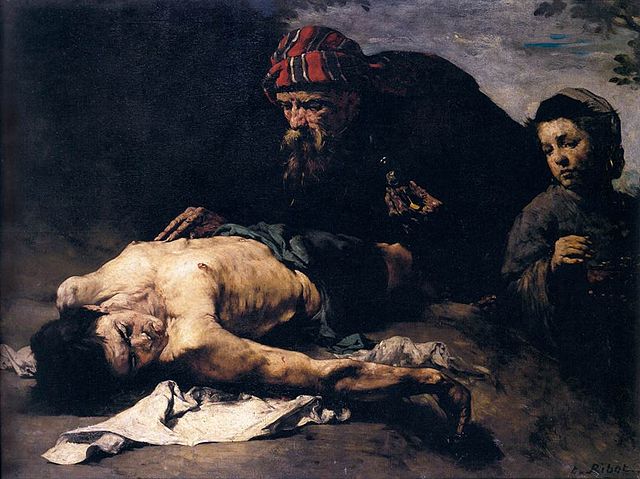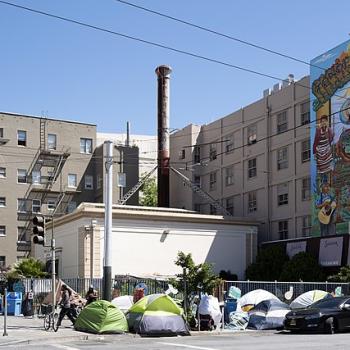
The Good Samaritan, by Théodule Ribot (1823-1891) [public domain / Wikimedia Commons]
* * * * *
Mark Shea put up a post called, “Bp. Robert Barron on the pro-life/social justice split in the Church” (8-30-17). It consisted entirely of comments from Bishop Barron in an interview. The thing is, I completely agreed with the good bishop, even though I’m not “supposed” to, according to the splits and mutual suspicions, stereotypes, caricatures, false dichotomies, prejudices, and forced “boxes” people are habitually forced into: that run rampant today (including within the Catholic Church). I’ve always been very socially conscious, while identifying as broadly politically conservative since 1980 (at age 22), following a very politically and socially liberal period in the 70s.
I had to chuckle over the first comment, where I was mentioned, as seemingly some kind of “poster boy” for the position that would be the opposite of what Bishop Barron was expressing (probably because this person is aware that I voted for Trump): “I cannot imagine that Dave Armstrong and I would ever be on the same page about pretty much anything.” I think this person would be greatly surprised if he understood my fully explicated positions on a host of social issues, and would find that we’re not nearly as far apart as his “box” — that he thinks I am in — would have it. It reminds me of the line in the 1965 Dylan song, Maggie’s Farm: “Well, I try my best / To be just like I am / But everybody wants you / To be just like them.” Or, more accurately in this instance, they want you to fit into the stereotype of what they mistakenly think folks are like who are politically different from them in some way.
This paper is one of my many attempts to create more dialogue within the Church, among those who politically disagree. Here are some of Bishop Barron’s notable remarks, that I wholeheartedly agree with:
[T]here was a tendency within Catholicism to fall into these two camps, and I’ve watched that all my life in the church. Call it left-right, liberal-conservative, or, as we see it in the Catholic context often, this: Are you more on the life issues or more on the justice issues? And it’s just a false dichotomy . . .
You return to Christ, and what you find there is this integrated view of life. And you see, of course, this profound concern for the inherent dignity of every individual person and the respect for life from conception to natural death clearly on display. At the same time, you see a clear passion for justice, from the Hebrew prophets all the way up to Jesus and then through the great tradition . . .
Yes, the church will say things that are intrinsically evil have to take a certain priority. So euthanasia and abortion are prime examples of things that are intrinsically evil, so they have to be opposed in a kind of prioritized way. But I think this should never blind us to the mutual implication, really, of these two sides. . . .
And I don’t think John Paul would mind this at all when I say he was the second-greatest evangelist of the 20th century — because the first, in my mind, was Mother Teresa of Calcutta. That no one evangelized more effectively than she is because of this radical commitment to the church’s social teaching. So it has a huge impact for evangelization, which is not just a matter of ideas but often a matter of witness.
As a nutshell summary of my “social” views, my Facebook “political profile” works nicely:
Conservative
Chestertonian-Bellocian Distributist. I’m highly influenced by Catholic social thought, which is often quite difficult to classify as either “right” or “left.” I’m very critical of the manifest excesses that far too often occur within corporate capitalism and of prominent libertarian and overly individualistic strains within the conservative movement. I advocate applying Christian ethics directly to how one ought to live (Jesus as the Lord of all of life), the proper place of money in the overall scheme of things, and the many biblical injunctions to help others less blessed than ourselves. Frank Capra’s classic film It’s a Wonderful Life illustrated the principles of Distributism (along with God’s providence) very nicely. I like the notions of simple living, agrarianism, small business, self-sufficient holistic health and alternative medicine (as much as possible), homeschooling (all four of our children), and subsidiarity. Passionately pro-life, of course. . . .
That has already busted quite a few stereotypes about what conservatives are “supposed” to be, hasn’t it? Now let me get more specific:
I was raised in a working-class neighborhood in Detroit, that was built during World War I.
I’ve been intensely interested in race relations for literally 50 years now: ever since the Detroit Riots of 1967. In the 70s I read such standard books on the topic as The Invisible Man and Black Like Me, and later I read Malcolm X’s Autobiography. The outrage of slavery was always of interest to me: how such an abomination could happen in this country and last so long. My two best (male) friends at my 80% African-American public high school (Cass Technical) were black homosexuals (though they were not yet “out” in the 70s).
Largely because of this interest and my fascination with people and how they act, I majored in sociology at Wayne State University in Detroit (third largest college in Michigan). Branching off of my interest in race relations and the evils of slavery, I also was fascinated with the history of Nazi Germany. “How could people become so unbelievably savage and evil?”: I wondered. And I studied it, but never really figured that out.
Only Christianity (that I started seriously studying a few years later) truly explains the presence of such utter evil. As a result of these studies, I’ve been very passionately against even the slightest trace of racism and anti-Semitism my entire life. I’m a great admirer of African-American (as well as Jewish) culture: especially the wonderful musical traditions and innovations, but a lot more than just that. And I absolutely love to learn about all the diverse cultures of the world.
We’ve raised our four children to be very aware of the history and injustices of systemic racism in America. They learned all about Dr. Martin Luther King and the civil rights era of the late 50s and early 60s (and about the horrors that Native Americans went through). On our many family vacations, we made an effort to visit actual civil rights sites, including Dr. King’s home in Montgomery, Alabama, his church, the place where Rosa Parks (whom I had the honor to meet) refused to go to the back of the bus, the sites of Dr. King’s final speech and murder in Memphis, and the route of the Selma-to-Montgomery March in March 1965, including the famous Edmund Pettus Bridge in Selma.
If I had been old enough, and able to do so, I would have certainly participated in the civil rights movement, just as I later (1988-1990) participated in the similar “civil disobedience” tactics of Operation Rescue. I blocked abortion clinic doors about 25 times, was arrested five times, went through three trials (dismissed, acquittal, and guilty), and served jail time (not much, but not nothing, either).
In Detroit, we have the actual bus connected with Rosa Parks in a local museum. And I located the spot near downtown Detroit where Malcolm X first served in a mosque. There is also significant underground railroad history in metro Detroit. On trips out west, we have visited many Native American sites: especially those connected with the great Crazy Horse (where he had his mystical visions, where he died, Custer’s last stand, etc.). He fascinates me to no end.
During one trip down south in 2009, we also visited several “music history” sites, including ones connected with black musicians like Muddy Waters, Sam Cooke, Nat King Cole, Robert Johnson, Bessie Smith, and Charley Patton. And back home we visited many gravesites of Motown artists, Jackie Wilson, and Son House: considered along with Patton as a co-founder of the musical genre of delta blues.
I wrote papers back in 2004 about slavery as America’s “original sin” and primary cause for Southern secession. I’ve written a host of articles about race relations and racial prejudice, on my “Political, Ethical, and Moral Issues” web page, where most of the articles I link here are listed.
I’ve studied and written about the breakdown of the family as a leading indicator of poverty and a life of crime and misery, especially among the poor in the inner cities. African-American (Democrat) political commentators such as Juan Williams often mention this, and it was a key thesis of the late Democrat Senator Daniel Patrick Moynihan. Related to this is the critique of LBJ’s well-intentioned “Great Society” or “War on Poverty” which has been a tragic failure, leading to abysmal family conditions that Moynihan accurately forecast in the early 60s.
I wrote about “The Catholic ‘Third Way’ in Socio-Political Thought” in 2002, and in 2006 I wrote about Catholic politics being “Neither ‘Left’ Nor ‘Right’, But Radically Orthodox or the ‘Radical Center'” (essentially the same point Bishop Barron is making above). I gave my opinion that America was the “wickedest nation ever” almost 16 years ago now: ten days after 9-11 (based on abortion). As one can imagine, that made me extremely unpopular for a time, and it is scarcely a typical conservative viewpoint. I’ve noted that the Bible is against unlimited accumulation of wealth.
I’ve written about the deleterious social effects of secularization and about the Catholic faith being far more important than political differences. I’ve excoriated libertarianism (which is a very prominent strain within conservatism). I’ve compiled resources (nine years ago) on subsidiarity and distributism. I’ve written several papers about Catholic social teaching in general (example). I’ve written two papers about tithing (saying it is not strictly required in the Bible and that giving ought to be progressive based on wealth), and two about our responsibility to beggars on the street, including in one an “Analysis of Poverty and its Causes and Solutions.” I provide conservative solutions, of course, but the point is that I am as concerned about it as any liberal on the face of the earth, and want to alleviate it. Same worthy goals; different means to accomplish it. The Great Society was a miserable failure. Most alternative conservative solutions haven’t even been implemented.
My son Michael wrote an essay about homelessness in 2012 that I completely agree with. We’re very proud of him. We’ve taught our children to be very concerned about the less fortunate, and in their youth groups they have often gone to soup kitchens and other charitable endeavors. My three boys have also taken several weeklong “mission trips” devoted to helping people down on their luck (painting, building ramps for the handicapped, etc.). Because of this, when one of their own friends was actually homeless for a time, we took him in, got him on his feet again, found a mobile home for him to live in, helped him get state aid and a job. I even raised money for him online. And they say conservatives don’t give a damn about the poor and homeless?
I have witnessed for Jesus on the streets of slums in Detroit and wanted to get involved back in the 80s in an outreach to the poor in Detroit, called “Joy of Jesus.” It didn’t work out (long story), but that was my heart and desire.
We allowed a young lady to continue to rent our old house (after I half-inherited another house) even though we knew she had been to jail and had a heroin problem. I lowered the rent when she was struggling. I let her use several appliances that we owned. We waived the security deposit. As a result, she took us for about three months’ rent, or $2000. Since I am not rolling in dough, I had to take out a loan to make up for that, and pay several hundred dollars in interest. I’m happy to report, however, that this young woman appears to have undergone sincere repentance at a Christian rehab center, and is getting her life on track.
Having a social conscience and trying to act as a Christian and follower of Jesus should have, and often has in fact, a concrete cost or sacrifice to it. But that’s the kind of person I am. Believe me, I wouldn’t mention these personal things at all if it weren’t for the constant unjust accusation and bum rap that conservatives and “old pro-lifers” don’t care about the poor or women, or homeless, or those on drugs, etc. Yes, we do! Please don’t believe the widespread politically generated wholesale lies about us as a group of people: as wicked, evil, racists and bigots. Don’t be fooled!
I don’t have much money to give to charity, being a poor full-time apologist with a mortgage and family of five, but when I do give, I try to be very generous, and tend to support families who are down on their luck.
I believe in universal health care: certainly for the relatively poor, and affordable health care for others. Obamacare is not the solution, as is obvious by now. There are many ways to approach it. We must find a way to get it done, and that requires politicians to work together to solve problems.
I totally oppose the death penalty. I oppose all torture, and waterboarding as an abuse and unnecessary.
I’m a passionate supporter of school choice: especially for poor people, desperate to get ahead and out of bad neighborhoods. The teachers’ unions fight this tooth and nail. Now, who cares more about the well-being of the poor children? I’m trying to get them a good education, so they can get good jobs and achieve upward mobility. Detroit public schools (that I attended in the 60s and 70s) are now some of the worst in the nation. They are guaranteeing perpetual poverty and misery. I favor free enterprise zones, to stimulate small businesses in urban neighborhoods. This was an idea of the late great Republican Jack Kemp.
I wrote about refugees, two years ago:
Bring the refugees in by the multiple thousands . . . but they must be vetted, just as immigrants have always been. . . . If people think vetting and checking documentation is so terrible, why don’t they also go after Ellis Island and the old (highly idealized) days of mass immigration, where this was always done? Everyone can cite stories of their ancestors coming through Ellis Island (some of mine came through Canada, just a few miles from where I sit, where my dad was from). What we never hear about, however, are how many were refused entrance. It was relatively few, but of course, this is what we are saying now: only a few should be disallowed. Of 12 million who came through Ellis Island between 1892 and 1954, about 2% were deemed unfit and now allowed into the country. You know how many people that is? 240,000 (about the population of Madison, Wisconsin). . . .We can still be humanitarian, by offering resources for food and shelter (as we always have), while we figure out a sensible solution to the refugee crisis. We can put these poor people up in some halfway decent facilities, paid for by our generosity, if needs be; proceed to methodically check out their backgrounds, and if they are fine, let them come here.This is not an either/or situation. It’s not “totally uncontrolled [including illegal] immigration” vs “evil nativist conservative bigots and fear-mongers” who oppose all immigration, legal or illegal.*That is not the case. Most of us who have legitimate concerns are quite as compassionate as the bleeding-heart liberals. I submit that we are more compassionate about innocent lives, because we not only care about the refugees (99% of which are likely harmless), but also about potential victims of terrorists who are exploiting the sad situation to come here and kill more people for the great Satanic jihadist cause. . . . There is a sensible middle here on the refugee crisis, that is quite consistent with Catholic teaching and traditional (and singular) American compassion and willingness to take in the “huddled masses”, and also legitimate vigilance in order to avoid terrorist tragedies in America.
Does that sound like I “hate” all immigrants: as the outrageous stereotype of President Trump and his supporters goes? I wrote in agreement (seven years ago) with the Catholic Church’s views on immigration.
I’ve written about alcohol, drugs, smoking, and gambling. I have a great interest in holistic health, herbalism, and natural remedies (which is usually considered to be a “liberal” trait). And when we find remedies that work, we try to share them with others, to alleviate misery. I like to solve problems and make people happy. I praised Pope Francis’ encyclical on the environment to the skies.
As an observant Catholic, I’m against homosexual practice as intrinsically disordered, but I have no patience whatever for mistreatment of homosexuals as persons. I have sought to treat them as charitably as anyone else, without distinction, in my many dialogues with them.
I detest and abhor any unequal treatment of women and have always sought to treat women as equals in every respect. In fact, I think they are superior to men: God’s finest creations. And that’s why I venerate the Blessed Virgin Mary so highly, and love writing about her. I vehemently deny that “old pro-lifers” do not care about women (or women with “problem pregnancies” in particular).
I adore all children.
I’m very ecumenical, and seek to dialogue with and learn from other viewpoints (including atheists), while not compromising my own at all.
Lastly, I’ve been a political junkie for over 40 years. Politics in the best sense is being concerned about the well-being of society and other people: interest in the public square, and civics and civic duty. So that is part and parcel of a social conscience. Many people don’t care about politics at all; won’t even vote. I do care, and the Church says that we should actively participate, and be the salt and light of our society, rather than allow it to descend into anti-Christian, anti-traditional pagan secularism.
I should add, also, that my wife Judy works with a group called “Birding By Ear and Beyond“: which is specifically for poor inner-city kids who are blind or visually impaired. It provides opportunities for them to do things that schools wouldn’t do: hands-on activities. She teaches them about living skills. She says about some of them that she has become close to: “they’re like my children.”
* * * * *
Now you, the reader, can decide what to make of me and my views. If you are a conservative, you may think, “yeah, I agree with a lot like that.” Or you might be “stretched” a bit, and find yourself considerably surprised that a self-described conservative could believe and do all these things. That’s good in either case!
If you are more liberal on the spectrum, perhaps you have been disabused of the many false caricatures and straw men that your colleagues in politics have spread about political opposition. Perhaps you see that we are just as compassionate and well-intentioned as you are. We don’t have hearts of stone and callous souls. We just have a few different approaches or proposed solutions to problems. In any event, we want to solve problems and help people, just as you do. And I can tell you that there are lots of conservatives who hold many of these views: not all, but many.
In the final analysis, we’re not that different from you at all, and I believe (heaven help my endless idealism and optimism) that we can work together in many ways and find common cause, if we’d just talk and get to know each other. That ought to be especially true among fellow Christians in the Body of Christ. Our Lord (see John 17) wants us to be one in mind and spirit.
I can and do talk to anyone of any belief whatever (short of outright hate groups — whether right or left — , where no discussion is possible). Many times, folks are not willing to talk to me. But I’m here waiting, whenever anyone is ready to dialogue and get to know and understand someone different from them in some ways, but similar in many other ways.
* * * * *













